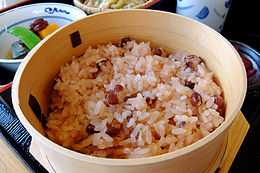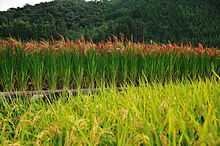Sekihan
| Sekihan | |
|---|---|
 | |
| Place of origin | Japan |
| Main ingredients | Glutinous rice, adzuki beans |
| Other information | Usually consumed during celebratory occasions (birthdays and weddings) |
|
| |

Sekihan (赤飯 lit. red rice, rice boiled together with red beans[1]) is a Japanese traditional dish. It is sticky rice steamed with adzuki beans, which give a reddish color to the rice, hence its name.[2]
The rice of ancient times of Japan was red. Therefore, red rice was used in the ancient divine work [in Japanese -- Google Translate translation]. Red rice has a strong taste of tannin, and its cultivation has been almost completely abandoned. The present Sekihan is colored red using azuki.
Sekihan is often served on special occasions throughout the year in Japan, for example, birthdays, weddings and some holidays, such as Shichi-Go-San.[2] In some places it is customarily made when a young woman reaches menarche, although this is less common now than it was in the past.
Sekihan is so strongly connected with celebration that the phrase "Let's have sekihan" has acquired the meaning "Let's celebrate." It is believed that sekihan is used for celebrations because of its red color, symbolic of happiness in Japan.
It is usually eaten immediately after cooking but it may also be eaten at room temperature, as in a celebratory bento (boxed lunch). Sekihan is traditionally eaten with gomashio (a mixture of lightly toasted sesame and salt).
There are also regional varieties of sekihan. Some versions call for sugar instead of salt to give a sweet flavor. Others use amanattō (sweetened bean confectionery) instead of azuki.
See also
- Azuki beans
- Black-eyed pea
- Kidney beans
- Camargue red rice
References
External links
| Wikimedia Commons has media related to Sekihan. |
| ||||||||||